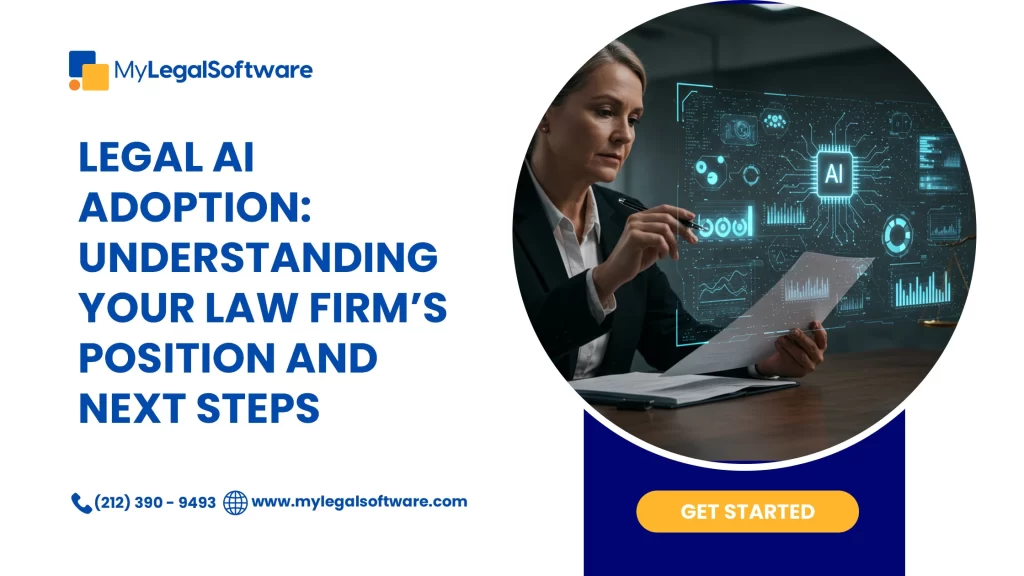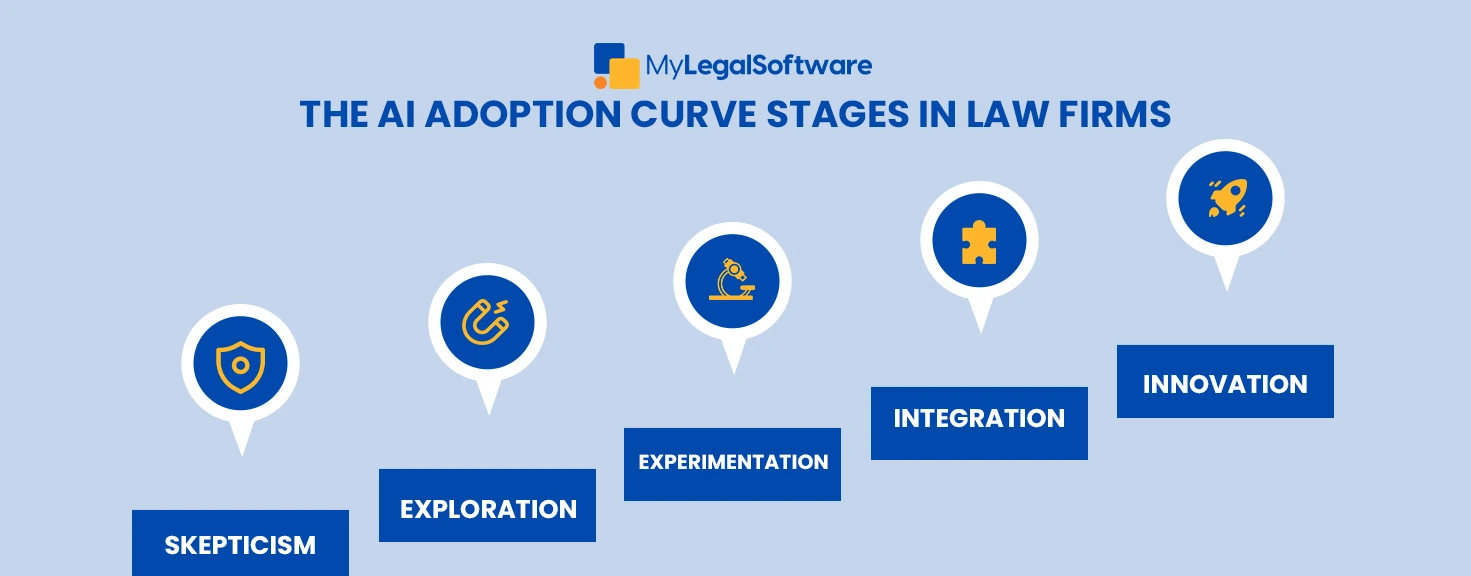Artificial Intelligence (AI) is reshaping how legal work gets done. From simplifying document review to improving caseload distribution, AI in law firms is providing access to capabilities that were unimaginable just a few years ago.
Law firms must understand the Legal AI Adoption curve to scale through. This curve highlights the different stages firms experience as they incorporate AI into their practice, from skepticism to full-scale innovation.
What Is Driving Legal AI Adoption?
Several factors are accelerating Legal AI Adoption. They include:
- Competitive Pressure: Clients expect faster, more efficient service.
- Advanced Tools: Sophisticated AI solutions now address legal tasks like legal research, document review, contract analysis, and predictive analytics.
- Cost Reduction: Automating tasks means fewer billable hours lost to administrative work.
- Better Client Service: AI enables faster response times and more transparent communication.
The AI Adoption Curve Stages
- Skepticism: Is AI Really Necessary?
Many firms remain cautious, worrying about confidentiality, bias, and ethical implications. They are skeptics who prefer tried-and-tested manual processes and view implementing AI in law as too risky or costly.
Next Steps for Skeptics:
- Explore low-risk AI applications like AI legal research tools or Generative AI for lawyers.
- Transition to cloud-based case management systems like MYLS General Practice Speed to build a strong foundation for future AI integration.
- Study how peer firms successfully adopted AI to inform your strategy.
- Exploration: Curiosity Without Commitment
Explorers show an active interest in AI for legal efficiency but are yet to take the plunge. They stay informed by attending webinars, reading industry reports, and following legal tech 2025 forecasts.
Next Steps for Explorers:
- Identify pain points where AI can add immediate value, such as document review or client intake.
- Start with pilot projects rather than firm-wide rollouts.
- Follow trusted sources like the MYLS Blog to stay updated on Legal Technology Trends.
- Experimentation: Early Trials, Inconsistent Results
Experimenters are firms that have dabbled in AI, using chatbots, document drafting AI or transcription services, but lack a cohesive strategy. They often juggle multiple tools and are inefficient.
Next Steps for Experimenters:
- Audit current AI tools: Which ones truly enhance productivity?
- Integrate AI solutions into your core systems. For example, MYLS incorporates AI into case management workflows.
- Offer training sessions to build firm-wide AI literacy.
- Integration: Embedding AI Across the Firm
Integrators use AI-powered legal tools in their operations, from client intake to contract analysis. These firms already see significant benefits but must now focus on scaling responsibly.
Next Steps for Integrators:
- Expand AI adoption to firm-wide applications.
- Establish clear, comprehensive AI usage policies.
- Monitor efficiency, cost savings, and client satisfaction to measure ROI.
- Innovation: Pioneers in Legal AI
Innovators represent the top 5–10% of law firms using AI to drive real transformation. These firms automate tasks and innovate with AI-enhanced decision-making and client services.
Next Steps for Innovators:
- Explore custom AI models for specialized tasks.
- Use advanced tools like MYLS General Practice Speed for real-time caseload optimization.
- Stay updated on ethical and regulatory standards to mitigate risk and ensure compliance.
Challenges of AI Adoption in Law
While the future of AI in legal practice looks promising, there are real challenges. They include:
- Data Privacy and Security Risks: Protecting sensitive information is non-negotiable.
- Limited Staff Adoption: Training and change management are essential.
- Integration Issues: Using standalone AI tools creates silos instead of streamlining operations.
- Ethical Concerns: Bias, hallucinations, and inaccurate outputs must be mitigated through human oversight.
- Difficult ROI Measurement: Establishing metrics is necessary to assess the actual value of AI investments.
- Regulatory Changes: Staying compliant with emerging AI regulations is a moving target.
How MyLegalSoftware (MYLS) Supports Legal AI Adoption
At MYLS, we believe AI should be strategic, seamless, and secure. Our software helps law firms across every stage of the adoption curve. MYLS General Practice Speed streamlines case management across multiple practice areas, featuring AI-driven collaboration and task automation.
The system is designed to future-proof your firm’s operations and enhance efficiency without the struggle of disjointed tech stacks.
What is the Future of AI in Legal Practice?
Looking ahead to Legal Tech 2025, AI’s role in law will only continue to expand. Expect innovations like:
- Generative AI for Lawyers to automate document drafting
- AI Legal Research platforms delivering near-instant answers
- Predictive Analytics helping firms strategize case outcomes
- Custom AI Tools tailored to firm-specific workflows
FAQ: Legal AI Adoption Curve and Law Firms
Why is AI adoption important for law firms?
AI in law firms improves efficiency, enhances client service, reduces operational costs, and allows legal professionals to focus on higher-value work. As part of legal technology trends, AI tools can automate routine tasks like legal research, document review, and contract analysis, giving firms a competitive advantage.
What are the stages of AI adoption in law firms?
The AI Adoption Curve stages are Skepticism, Exploration, Experimentation, Integration, and Innovation.
How can law firms start implementing AI successfully?
Law firms can do the following:
- Begin with low-risk tools like AI-powered legal research or generative AI for administrative tasks.
- Focus on specific pain points rather than trying to automate everything at once.
- Transition to cloud-based legal practice management platforms like MYLS to create a solid tech foundation.
- Train staff on ethical AI use and maintain human oversight.
Which role will AI play in the future of legal practice?
The future of AI in legal practice will see AI tools becoming deeply integrated into case management, client service, and billing. AI-powered legal tools will assist, not replace, lawyers, freeing them to focus on legal reasoning, client advocacy, and business development.
How can MYLS help with Legal AI Adoption?
MYLS is a cloud-based legal practice management system with integrated AI capabilities. It can help firms move smoothly from experimentation to full integration. MYLS simplifies workflows, improves caseload management, and supports a scalable approach to AI adoption in law firms.
Final Thoughts
Know where your law firm stands on the Legal AI Adoption Curve to make informed technology investments and strategic plans. Start by assessing your current stage, address your challenges head-on, and create a roadmap for smarter and more client-centered legal services with the help of AI.
Want to know the Top AI Time Tracking Tools for Lawyers in 2025? Go here.










